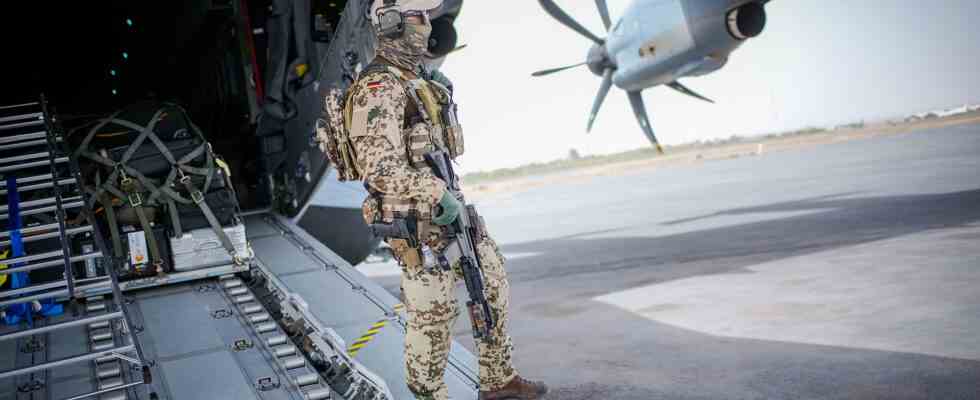Status: 11/22/2022 9:56 p.m
The Bundeswehr should initially remain in Mali – but also make preparations for a withdrawal by May 2024. The federal government has agreed on this. The corresponding mandate should follow – a compromise.
The federal government wants to continue the deployment of German soldiers in West African Mali for the time being, but will start withdrawing them in the summer of 2023. This information is the ARD Capital Studio in Berlin after a top-level meeting of the Chancellery and ministries. Chancellor Olaf Scholz (SPD), Foreign Minister Annalena Baerbock (Greens), Defense Minister Christine Lambrecht (SPD) and Development Minister Svenja Schulze (SPD) attended the meeting.
Hebestreit: last extension
According to government spokesman Steffen Hebestreit, the mandate for the Bundeswehr mission in Mali is to be extended by a year for the last time in May 2023. The aim was to “expire the operation in a structured manner after ten years,” Hebestreit explained. According to the spokesman for the federal government, the elections in Mali, which are scheduled for February 2024, “should be taken into account”.
“The Malian government cooperates only a little”, Martin Schmidt, ARD Berlin, on the planned withdrawal of the Bundeswehr from Mali
Tagesschau 5:00 p.m., 22.11.2022
Withdrawal by May 2024
In a new mandate, ARD-Information on the one hand that the troops will be deployed until 2024 – but also that “entry to exit” should begin next year. The withdrawal from Mali could follow by May 2024 ARD-Information to be completed. This is also in line with previous estimates by military planners that a full withdrawal would take about a year.
Lambrecht said: “That means security for the soldiers, who know what to expect. And that also means security for us in the political arena and a turning point in terms of evaluating and then drawing the right conclusions.”
step had become apparent
The current Bundestag mandate for the mission in Mali is valid until the end of May 2023. The Bundestag had Voted for extension at the end of May this year – but for the first time a withdrawal clause is anchored in the mandate in the event that the security of the Bundeswehr soldiers in Mali can no longer be guaranteed.
The withdrawal of the currently almost 1200 Bundeswehr soldiers from Mali became apparent after France ended its mission and other nations such as Great Britain had at least announced a troop withdrawal.
Compromise between Baerbock and Lambrecht
With the compromise that has now been found, a difference of opinion between Foreign Minister Annalena Baerbock, who wanted a continuation, and the more critical Defense Minister Lambrecht seemed to be defused. Recently there had been repeated disputes between the military rulers in Mali and the UN mission MINUSMA, for which Germany provides soldiers. The Federal Foreign Office is more likely to be in favor of further military engagement, also with reference to Mali’s importance for the stability of the region.
Mali, with a population of around 20 million, has experienced three military coups since 2012. Since the most recent coup in May 2021, the country has been led by an interim military government.
Discussion in the coalition about the planned withdrawal of the Bundeswehr from Mali
Martin Schmidt, ARD Berlin, daily topics 9:45 p.m., 22.11.2022
Criticism from the AfD, praise from the Greens
The defense policy spokesman for the AfD, Rüdiger Lucassen, said the planned withdrawal was taking too long: “In my view, it is almost a mockery of the soldiers to say, on the one hand, that we have to withdraw, but we have to stay there for another year and a half. That has to explain them, the rationale is absolutely missing.”
The defense policy spokeswoman for the Greens, Sara Nanni, welcomes the plan. So the United Nations would have the time to organize a transition in Mali even without Germany: “It suits us as Germany to be reliable. Being reliable means that the United Nations have the opportunity to create a transition. A Find a solution for the time without Germany.”
What is the Bundeswehr doing in Mali?
The Bundeswehr has been deployed in Mali since 2013. Around 1,200 Bundeswehr soldiers are currently involved in the UN peacekeeping mission MINUSMA. The aim of the mission: to stabilize the country and, above all, to protect the population from Islamist militias. The situation has worsened over the course of the mission. Mali is currently considered the most dangerous deployment of the Bundeswehr.
Within the MINUSMA mission, the Bundeswehr soldiers are responsible for military reconnaissance with unmanned and unarmed drones and reconnaissance vehicles.
Recently, the operational capability of the Bundeswehr has been repeatedly restricted by the Malian government. Since mid-October, for example, the use of Bundeswehr transport aircraft and reconnaissance drones has no longer been possible. The Malian military junta has also worked more closely with the Russian mercenary group Wagner.
With information from Uli Hauck, ARD Capital Studio Berlin

